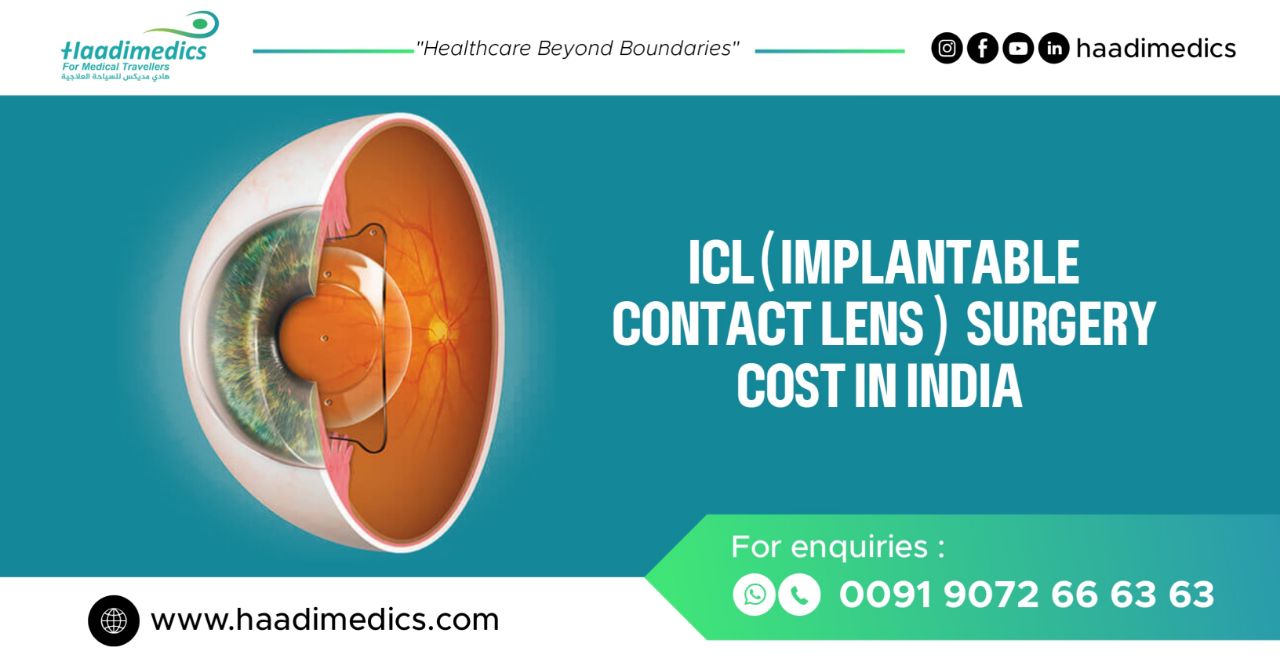In recent years, India has emerged as a hub for advanced ophthalmic procedures, offering cutting-edge technologies and skilled ophthalmologists at competitive prices. One such procedure gaining popularity is Implantable Contact Lens (ICL) surgery. With modern facilities and a skilled workforce, Indian hospitals have achieved significant success in performing ICL surgeries. Patients from around the world seek treatment in India due to its reputation for delivering high-quality care at affordable prices.
What is ICL Surgery and why is it done?
ICL surgery involves implanting a corrective lens inside the eye to correct refractive errors such as myopia (nearsightedness), hyperopia (farsightedness), and astigmatism. Unlike traditional contact lenses, ICLs are surgically inserted into the eye's posterior chamber, offering permanent vision correction without the need for daily maintenance. This procedure is ideal for individuals seeking freedom from glasses or contact lenses and may be recommended for those ineligible for LASIK or PRK.
Risks associated with ICL Surgery
While ICL surgery is considered safe and effective, it carries some inherent risks, including:
1. Infection
2. Glare and Halos: Some patients may experience glare, halos, or visual disturbances, especially during the healing period.
3. Cataract Formation: In rare cases, ICLs may contribute to the development of cataracts over time.
4. Elevated Intraocular Pressure: The surgery may lead to increased intraocular pressure, necessitating monitoring and management.
Preparation for ICL Surgery
Before undergoing ICL surgery, patients typically undergo a comprehensive eye examination to assess their candidacy. This evaluation includes measuring the curvature and thickness of the cornea, assessing the pupil size, and determining the power of the ICL required for optimal vision correction. Patients may be advised to discontinue wearing contact lenses for a specified period before surgery to ensure accurate measurements.
Procedure
ICL surgery is performed under local or topical anesthesia and typically takes less than half an hour to complete. During the procedure, a small incision is made in the cornea, and the ICL is inserted into the eye's posterior chamber behind the iris. Once positioned correctly, the lens unfolds and settles into place, providing immediate vision correction. Patients can usually return home shortly after the surgery and experience minimal discomfort during the recovery period.
Best Hospitals in India for ICL Surgery
- Sankara Nethralaya, Chennai
- Aravind Eye Hospital, Madurai
- LV Prasad Eye Institute, Hyderabad
- Dr. Agarwal's Eye Hospital, Chennai
- Shroff Eye Centre, Delhi
- Center for sight, New Delhi
- Bharti Eye Hospital, New Delhi
- Apollo Hospitals, Greams Road, Chennai
- Eye Q Hospital, Gurgaon
- Fortis Memorial Research Institute, Gurgaon
- Indraprastha Apollo Hospital, New Delhi
Top Doctors for the Surgery
- Dr. Dharitri Samantaray
- Dr. Deependra V Singh
- Dr. Viswanathan P
- Dr. Pratik Ranjan Sen
- Dr. Sunaina Arora
- Dr. Dheeraj Gupta
Cost Comparison
India – INR 85000 (USD 1017)
Turkey – USD 2500
Thailand – USD 2500
FAQ
1. Is ICL surgery permanent?
Yes, ICL surgery provides permanent vision correction, and the implanted lenses remain in place indefinitely.
2. Am I a candidate for ICL surgery if I have astigmatism?
Yes, ICL surgery can effectively correct astigmatism in addition to myopia and hyperopia.
3. Is ICL surgery painful?
No, ICL surgery is typically painless and performed under local or topical anesthesia.
4. How soon can I resume normal activities after ICL surgery?
Most patients can resume normal activities within a day or two following surgery, although strenuous activities should be avoided for a few weeks.
5. Can ICL surgery cause dry eyes?
Some patients may experience temporary dryness following surgery, but this is usually temporary and resolves with time.
6. Is there a risk of ICL displacement or movement?
ICLs are designed to remain stable and secure within the eye once implanted, minimizing the risk of displacement.
7. Will I still need glasses after ICL surgery?
While the majority of patients experience significantly improved vision following ICL surgery, some may still require glasses for certain activities, such as reading or driving at night.
8. Are there any dietary restrictions before or after ICL surgery?
Patients are typically advised to avoid eating or drinking anything for a few hours before surgery and to follow any specific pre-operative instructions provided by their surgeon.
9. Is ICL surgery covered by insurance?
Some insurance plans may cover a portion of the cost of ICL surgery, particularly if it is deemed medically necessary.
10. What is the success rate of ICL surgery?
ICL surgery has a high success rate, with the majority of patients achieving significant vision improvement and satisfaction with their results.


Comments